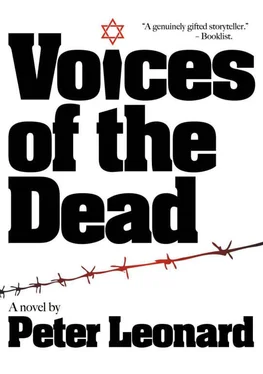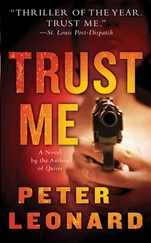Hess was trying to make sense of what had happened. He had finally managed to calm his daughter. Thank God Elfriede was out of town. He’d never hear the end of it.
“Papa, who was that man?” Katya had said. “What is this about?”
Hess had asked himself the same questions and there were no clear answers. He had lied and said, “The man is a lunatic from the factory. The police have arrested him. Don’t worry. You will never see him again.” Hess smiled to reassure her.
“Papa, if anything happened to you I don’t know what I would do.” She hugged him and went upstairs.
An hour later, Hess was sipping a glass of single malt, his third, trying to relax. He tossed a pile of surveillance photos onto the desktop. Rausch picked them up, looking at half a dozen shots of the intruder, different angles showing him going over the wall, moving through the trees, standing behind the fence next to the tennis court. But none clearly showed his face. He was about six feet tall, dark hair, medium build. “Do you recognize him?” He stared at Rausch’s blank face, waiting for an answer.
“I don’t think so,” Rausch said.
“Are you sure?” Hess was looking at the scar on his cheek, the red line of tissue where the stitches had been.
Rausch shook his head.
“You should after what he did to you.”
“The one in the restaurant?”
“The crazy Jew from Detroit,” Hess said. He could not understand the man’s behavior, coming to his home with a gun for what had been an accident. It didn’t make sense.
“What do you want me to do?” Rausch said.
“Find him.”
Cordell Sims walked out of the brig at the United States Army Garrison in Heidelberg, Germany at 10:00 a.m. on Wednesday, September 10, 1971. He’d been in five days — going out of his mind — for punching out his sergeant. Cordell decided he’d had enough of this man’s army.
He’d gone before his commanding officer, Colonel Stubbs, a Korean War vet, career officer, the colonel behind his neat, spotless desk. Cordell in a chair in front of him, looking at this pale-skinned dude white as Cordell was black.
“Private Sims, when you enlisted in the United States military you swore to defend the Constitution against all enemies, foreign and domestic, and bear true faith and allegiance to the same. You swore to obey the orders of the president of the United States, and the orders of the officers appointed over you, according to regulations and the Uniform Code of Military Justice. With that you made a promise to the United States military,” Colonel said, giving him a howitzer round of army-speak, eyes on him like lasers. Man paused. “Military discipline and effectiveness is built on the foundation of obedience to orders, private.”
Colonel‚ all worked up now, had white stuff in the corners of his mouth looked like mayonnaise, made him kind of sick at his stomach. “This ain’t about defending the Constitution or questioning orders,” Cordell said. “It about racism. I think maybe I better talk to a lawyer.”
“If your situation had become acrimonious, you should have gone through proper channels and filed a complaint. Was there antilocution?”
Cordell said, “Anti-what?”
“Badmouthing.”
“He call me shitskin and nigger,” Cordell said. “That qualify?”
Colonel Stubbs opened his desk drawer, took out a folder, opened it and started to read.
“According to Article 90 of the Uniform Code of Military Justice, any enlisted person who strikes his superior commissioned officer or draws or lifts up any weapon or offers violence against him while he is in the execution of his duty; or willingly disobeys a lawful command of his superior commissioned officer; shall be punished. If the offense is committed in time of war, by death or such other punishment as a court martial may direct.” He closed the folder and glanced at Cordell. “Private Sims, I’m trying to impress upon you the consequences of your actions.”
Cordell said, “You going to put me to death ’cause Sergeant don’t like black people?”
Colonel wiped the white stuff off his mouth with his thumb and index finger, looked at it and brought his hand under the desk, probably wiped it on his pants.
“After completing an inquiry I understand there are extenuating circumstances.”
“Yes sir,” Cordell said. “Like Sergeant Nobis stepping on my spit-shined boots could see your reflection in. Sergeant says, ‘Boy, them boots is all scuffed up,’” doing his best Sergeant Nobis impression. “‘Better shine ’em real good,’” grinning like a redneck. “Or he check out my bed during inspection, sheet and blanket so tight could bounce a dinner plate off it. Sergeant Nobis picks up the mattress dumped it on the floor, says, ‘Private Sims, looks like you had better square up your bunk.’”
Cordell had been there a month, arriving right after he finished boot camp, and this treatment had gone on every day. Cordell took it till Sergeant Nobis called him shitskin. And to his credit, he didn’t just swing away. He brought his arms up, fists clenched, gave the redneck a chance. “‘Sarge, get ready. Going to knock your cracker head off.’ He says, ‘Keep talking darkie, I’m going to write you up for insubordination.’”
“You should have come to me,” Colonel Stubbs said. “Punching out your superior isn’t good for discipline or morale. I might’ve been able to handle this under Article 15, you didn’t knock him out in front of the whole platoon.” He stopped like he was thinkin’. “Way I see it there are two ways you can go here, Private. I can dismiss the charges and reassign you, or I can try to arrange a special court martial with a military judge and have you dishonorably discharged from the United States Army.”
“I take the discharge,” Cordell said. He had had enough of the uniform, the bad food, taking orders.
“Consider your decision very carefully,” Colonel said. “A dishonorable discharge is on your record. It could come back to haunt you.”
If it got him out the army he didn’t care.
The DD was his second break.
First one happened after getting busted for selling heroin to an undercover cop, dude giving an Academy Award performance. Cordell shocked when the man pulled his badge and gun. Looked, smelled, talked like a junkie. Should a handed in his badge gone to Hollywood.
At the time he was trying to make money to support himself, momma had took to the streets, disappeared for weeks at a time. Show up for a few days, disappear again.
Case was going to trial. Cordell’s court-appointed lawyer, Mr. Paul Monicatti, told him he could get five years or more, first offense, depending on the judge. But Counselor Monicatti had an idea.
He went to the man said, “Your honor, Mr. Sims is only nineteen years old. He has his whole life ahead of him. In lieu of incarceration, he would like to join the United States Army and make something of himself.”
“I’ll bet he would,” the judge said. “And I agree. Mr. Sims is on probation until he enlists, at which time I will discharge his probation with improvement. The court will have no further involvement. Let the army have Mr. Sims. A tour in Vietnam might do him good.”
Maybe his honor had got laid that morning. Whatever the reason for his leniency, a week later Cordell was sitting in a barber chair, Fort Benning, Georgia, getting his Afro shaved.
After boot camp Cordell had looked at his options. No way he wanted to go to Nam, fight some Orientals ain’t done nothing to him. So where? Brother from Nashville was shipping out to join the 7th Army at the garrison in Heidelberg, Germany. Looked good. Picturesque town with castles like in a Disney movie. He could see himself all over it. Check out the German food and the German ladies, get himself some German poon. Base was there to keep an eye on the Commies and the Berlin Wall.
Читать дальше












